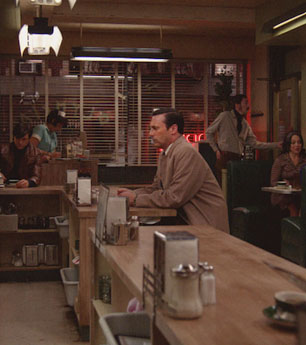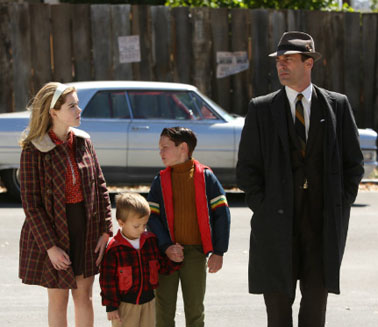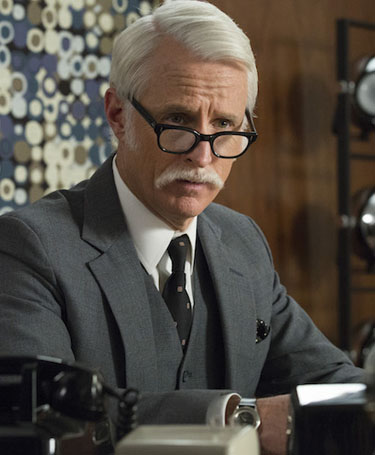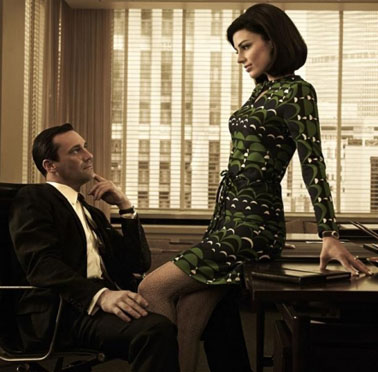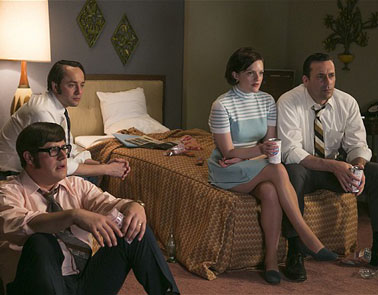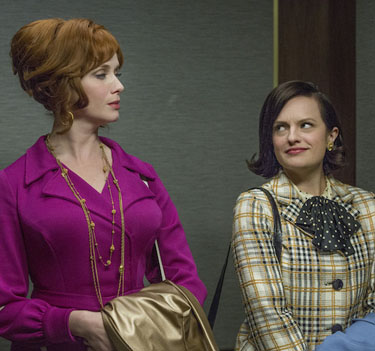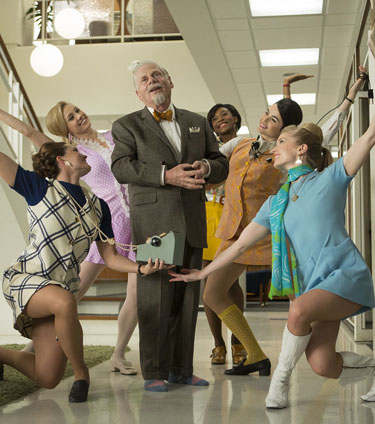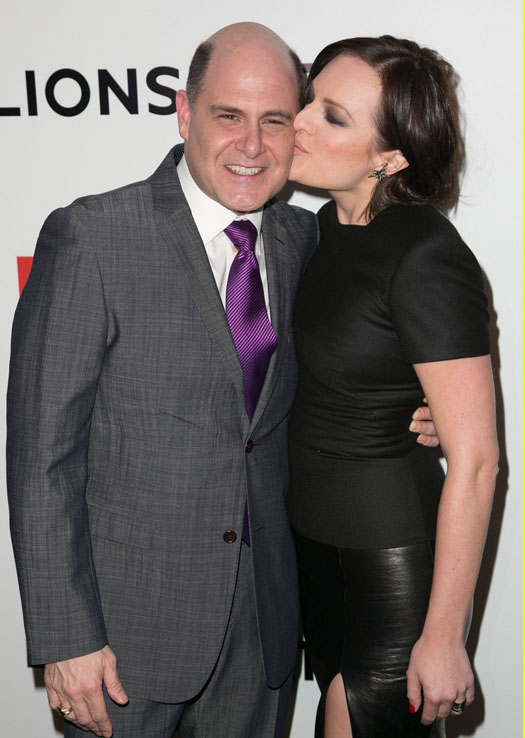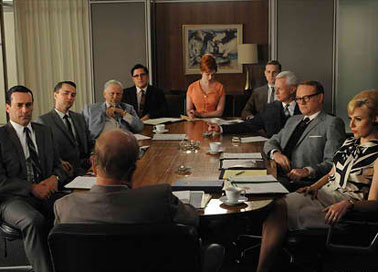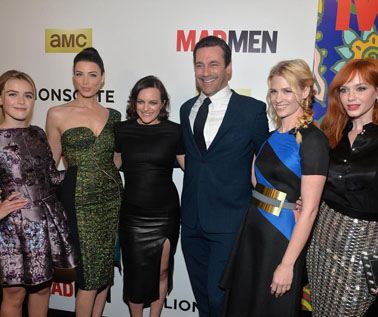Mad Men and the British election .. two cultures in US and UK (and three other elections this week in Canada)
May 3rd, 2015 | By Citizen X | Category: In Brief[UPDATED MAY 8.] Tonight (Sunday, May 3, 2015 at 10 PM ET) will bring what the on-air promo somewhat confusingly calls the second-last episode “before the finale” of Matthew Weiner’s still quite excellent US TV series Mad Men.
In plainer language it’s the third-last episode. The last one will air on Sunday, May 17. And I count myself among all those who will be more or less sad.
It’s not to everyone’s taste. But for me Mad Men has always been something to look forward to on TV, since it began in the middle of the summer of 2007 on the upstart AMC cable network.
Much more recently when, in the words of Wikipedia , the “second half of the final season premiered on April 5, 2015,” I stumbled across “The Shock of the Pretty … James Meek writes about ‘Mad Men’” in the London Review of Books.
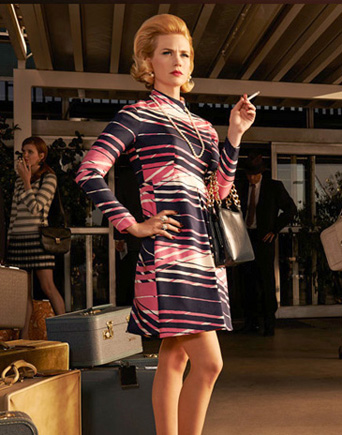
Don’s first wife, and mother of his children, Betty. Crazy, hot, mean, beautiful, smart, well-educated.
Meek is “a British novelist and journalist,” who “was born in London, England, and grew up in Dundee, Scotland.” I came away from his piece on Mad Men mostly thinking about how different the two English language cultures of the United States and the United Kingdom still are, even in the early 21st century.
So it has been said in our time : “As [English comedian] Eddie Izzard wisely observed : ‘America and Britain are divided by the Atlantic Ocean.’”
In any event all this finally reminded me that there will be a UK general election this coming Thursday, May 7, 2015. Â And here I have also been informed and stimulated by the London Review of Books.
David Runciman’s election notes are one case in point. Another is John Lanchester’s election reporting on the LRB website blog, which now has 16 “Episodes. ”
Lanchester’s two most recent British election reports are highly recommended – “Episode 15: Sinn Féin changes the maths” ; and then “Episode 16: The Balance of Power.” He has figured out two somewhat interesting things, I think.
First, you might imagine that a bare majority in the 650-member UK House of Commons would be 326 seats. But that leaves out the five current Sinn Féin MPs from Northern Ireland, who everyone seems to think very likely to be re-elected. They say they will continue to abstain from physically occupying their seats at Westminster, as a protest against Northern Ireland’s continuing union with the United Kingdom. So there are only 645 not 650 seats actually in play – and a bare majority is only 323!
Second, unless things change dramatically between now and this coming Thursday, no party will win even close to even a bare majority of seats in the British House. To avoid another election immediately, there will have to be some sort of coalition government, or at least a minority government with dependable enough supporters in other parties to sustain a working majority in parliament. To add to the confusion, the various possible combinations among Labour, Conservatives, and the several smaller but increasingly important parties depend a great deal on exactly how many seats the Conservatives and Labour win.
Meanwhile, as noted by the counterweights editors last week, other elections are also on our immediate horizons north of the North American Great Lakes. The first round of voting in the Ontario Progressive Conservative leadership contest takes place today. There will be Canadian provincial elections in Prince Edward Island on Monday and (a suddenly very interesting case?) Alberta on Tuesday. The second round of Ontario PC voting as well as the UK election will follow on Thursday. The Ontario PC leadership results will be announced on Saturday (May 9). And as icing on the cake, the last days of Mad Men in the USA will still be swirling around us for another mysterious week after that. And those who thirst for a little more on all these diverse subjects can always just click on “Read the rest of this page” and/or scroll below … Â Or not …
1. Ontario PC leadership
I have nothing of vast consequence to add here to the counterweights editors’ report of April 24.
But since then see Robert Fisher on “Will upstart Patrick Brown upend Christine Elliott in Ontario PC leadership race? … At outset, Brown was an unknown — now what’s unknown is who will win.”
And Martin Regg Cohn, “How Patrick Brown could be Ontario’s next premier … Â The Conservative MP from Barrie is the best salesperson Ontario’s PCs have ever seen.”
The recent headline from Mr. Brown’s Barrie hometown – Â “Ontario government to review disaster relief program: CTV News Exclusive” – does not relate directly to the official Ontario PC leadership convention on Saturday, May 9.
2. PEI election
The Liberals may win again, but both main parties share some social conservative values.
See, eg : “PEI Liberals, PCs oppose offering abortions.” (The province apparently does pay, however, when Islanders have abortions in neighbouring provinces, to follow through on its Canada-wide Charter of Rights commitments.)
3. Alberta election
This remains the unexpected sudden great fascination of the first half of 2015 in Canadian politics. Â Maybe.
For some latest developments beyond the counterweights editors’ report of April 24 see : Â “Alberta NDP poised for historic breakthrough, new poll suggests” ; “Albertans predict PC majority despite polls giving edge to NDP” ; “Nenshi predicts PC minority government in Alberta election” ; and “Ralph Klein’s daughter endorses Alberta NDP.”
If Alberta really wants to hone its growing reputation as English-speaking Canada’s answer to Quebec, however, it also has to spend a bit more time studying such recent headlines as “Topless woman crashes Quebec minister’s news conference.”
(And that joie de vivre is what has always made the Montreal Canadiens a really great hockey team – still the classic model team for every true hockey fan everywhere : well … Â everywhere in Canada anyway.)
4. British election

Don and some friend of his second wife’s, lost in the late 60s smog of LA ... remember those jackets?
I’m waiting for John Lanchester to tell me what is finally going to happen here in the LRB blog. Till then I remain personally agnostic as well as ignorant.
Whatever happens, it does seem from a distance  that, even though the Scottish independence referendum lost last September, the UK is nonetheless changing.
(Not altogether unlike parallel movement in Canada and Quebec after the failed independence referendums of 1980 and 1995?)
So far at least this 2015 general election to the old Mother of Parliaments seems to be underlining the change rather darkly – though certainly not in any remotely impossible directions!
5. Mad Men : some semi-final thoughts
For the most part I didn’t find that “The Shock of the Pretty … James Meek writes about ‘Mad Men’” in the 9 April 2015 Â London Review of Books put a finger on the kinds of things I like (or dislike) about the show.
For one thing Mr. Meek is clearly a very smart and accomplished human being. But I don’t think he likes Mad Men in some elemental sense. The phrase “Shock of the Pretty” does seem to summarize his essential reaction to the show. Â And it’s not the reaction of a person who finally just likes the entertainment.
I do like Mad Men in some elemental sense myself. I think I’d probably agree with the criticism that its later episodes have not always lived up to the heights scaled in the first few seasons. But I still think it’s great American TV, and I haven’t missed an episode. Having now had the benefit of the first four of the last seven episodes, I think it’s going out in at least a warm enough blaze of glory as well.
If I took James Meek’s generally quiet and measured criticisms of Mad Men altogether seriously, I might think my fondness and even admiration for the series was a sign of lack of discrimination in cultural judgment, or some such weighty thing. Instead I just think Mr. Meek is deeply steeped in the rich culture of the United Kingdom and its European surroundings. In the end he just doesn’t get the things about Mad Men that reflect the different culture of the United States, which has arisen in response to the needs of what remains a  different kind of society, in some crucial respects at least.
All this could go off in many confusing directions. For now I’ll just focus, like a Sunday preacher, on two short excerpts from Meek’s “Shock of the Pretty” text.
In my first case the TV critic is complaining about the verisimilitude of the historical re-creation. To quote Mr. Meek directly : “It’s one thing, it turns out, to ask those responsible for the texture of fictional TV worlds to re-create the 1960s, quite another to get them to take that re-creation and make it scruffier, meaner, more disappointing, more real.”
There is a difference between US and UK TV and virtually everything else here, I think. And, perhaps especially nowadays, we in a place like English-speaking Canada inevitably fall in with our North American brethren (like it or not). I at any rate just don’t want the historical re-creation I see on TV or in the movies and so forth to be all that much “scruffier, meaner, more disappointing, more real.” (The great UK series of 1984, The Jewel in the Crown, eg, was too much this way even for my British North American taste, to take just one case in point!)
I’d also concede that looking at things my way here can, if pursued too foolishly, promote various forms of cultural weakness. When it came to entertainment my old Toronto father (who actually did work at an advertising agency in the 1960s) wasn’t interested in the real world. He got enough of that, he would stoically observe, at work. When it came to entertainment, he wanted to be entertained.

Could Don and Peggy ever just wander off into some sunset? No : couldn’t work, right? She could never really hold him? And would she even want to?
My father often told us that he led by setting bad examples we were not really meant to follow. And I long ago recognized the limitations of his opinion about good entertainment. In my own older days, however, I have found that I have wound up secretly emulating rather than rejecting many of my father’s bad examples. I think there is a compelling justification for my behaviour somewhere – and finding it is an important quest of my golden years.
In any event I think one of the great visual things about Mad Men is that it somehow re-creates the slick less-is-more surface of so much of the (North) American advertising product of the 1960s. If you lived through that time and place yourself, on TV and radio and in print, you remember that product, and you like the way Mad Men brings it back. Of course it’s just an interpretation. It’s “art.” It’s not “real.” And that’s part of its worth and its appeal.
I won’t go on further at this juncture. Except to say that while I think James Meek on Mad Men is well worth reading, and helped keep me awake and interested, I also think he’s entertaining his own foolish thoughts towards the end of his piece, when he writes : “There’s never a sense that advertising is being conceptually challenged in Mad Men. To say, ‘Behold the ad man, selling himself to the world with the same tricks and lies as he sells soap,’ is moderately interesting. To say, ‘Behold advertising, as rotten as its prince of lies, Don Draper,’ would be subversive. But Mad Men doesn’t say it.”
The big problem here, I think, is that the show is about advertising. And to be honest to itself and its own internal ethos it can’t convey the message that advertising is essentially rubbish – a word it seems popular to say in the UK these days. A show that finally said advertising is rubbish wouldn’t be a show about advertising. It would be a show about the critical theory that Lip is studying with his beautiful lady professor at the University of Chicago these days, in the later American version of what was originally a UK TV series called Shameless.
6. “Poignant hints about where an older America is headed today” ????
Last week I had lunch with my longtime colleague, the amazing Dominic Berry. At the old Blue Grotto, on the west side where the windows look out on the patio.
I reminded him that, back in the fall of 2008, on this site, he was agreeing that “‘Mad Men … is by far the best show on tv.’ I find it utterly gripping. And I think this is partly because it is delivering poignant hints about where an older America is headed today. (It is not surprising that a ‘Mad Men DVD was spotted at the elbow of Barack Obama aboard his campaign plane.’)”
The sporting Mr. Berry’s first comment was, inevitably (he is even older than I am) : “Did I say that? Really?”
“Would you still stand by that assessment today, about what, six and a half years later?” I asked him.
“I have thought a little about it,” he said. “After I read that Meek article too … I’m not as sure or optimistic, I guess, about “delivering poignant hints about where an older America is headed today … Obama’s presidency has changed things too.”
We agreed to get together again and talk about it all, after the elections. Maybe wait until the end of the TV show on May 17 too. I seem to remember that another of Dominic’s points about Mad Men is that it’s a kind of great American novel of its time. And surely James Meek is wrong about Betty and Pete as “more interesting” characters than Don. The entirely re-invented Don Draper and his fate are at the heart of Mad Men. He is who we wonder most about at the end.
Jay R. Ferguson, the Texas actor who “plays art director Stan Rizzo in the period drama,” has recently advised : “I’ll just say that I think the fans are going to be really pleased with the way it all wraps up … I think that if you’re a fan of this show, you know to expect the unexpected. So if you think you’ve got it figured out, then I would just encourage you to get used to disappointment, because chances are you probably don’t.”
UPDATE MAY 8, 2015 : I have just finished reading “Mad Men, Season 7: ‘Lost Horizon’ by Phillip Maciak … Age of Olson,” in the Los Angeles Review of Books. And I’d agree that  Phillip Maciak does make a compelling enough case for Peggy Olson as, for him at least, a more interesting character than Don Draper.  And it is certainly one of Mad Men’s many strengths that different audience members can come at it from different angles like this.
At the same time, the clearly very smart and interesting Mr. Maciak also believes that “Don Draper is the sun around which this show orbits.” His only serious question here is “who loves the sun?”
I’d rush in to add “lots of ardent Mad Men TV viewers. And I’m one of them.” Â I think Don may even be the only character I care about deeply myself – maybe Betty because I’m that twisted, and I do find Roger especially interesting, and I agree that Sally has been the big surprise of the last few years. But unless something happens over the next two Sundays to dramatically change my mind, I still think what happens to Don has to be one crucial key to everything else.
(Though btw I also like current NY art director Stan Rizzo quite a lot, and I think it’s a good joke that he’s played by a guy from Texas! No doubt all successful TV shows like this also work because they have a number of or even many interesting characters! Along with a sun they can orbit around. Best wishes, X.)
